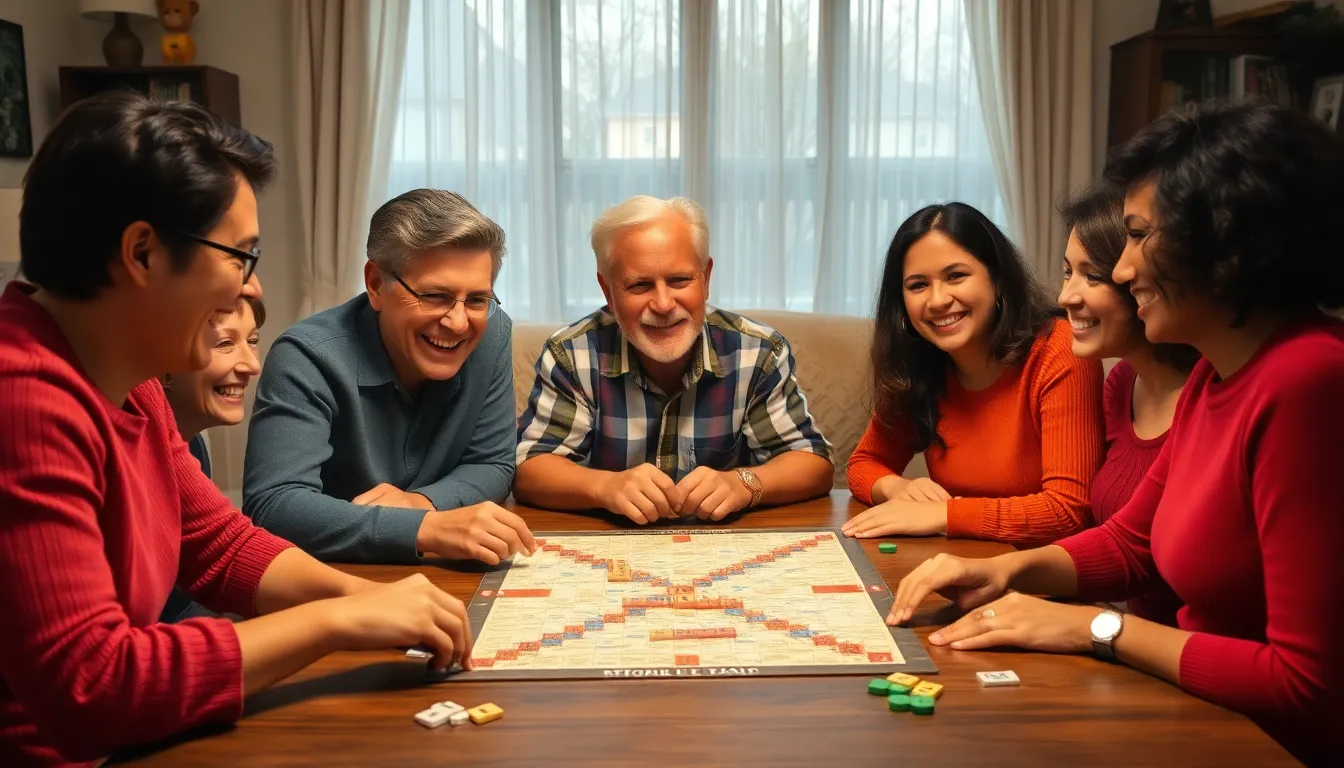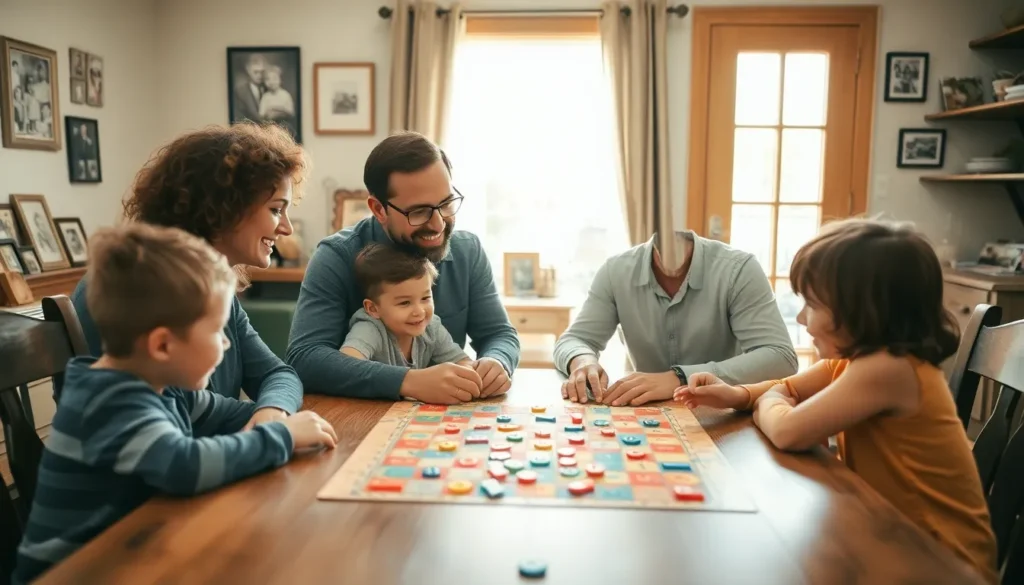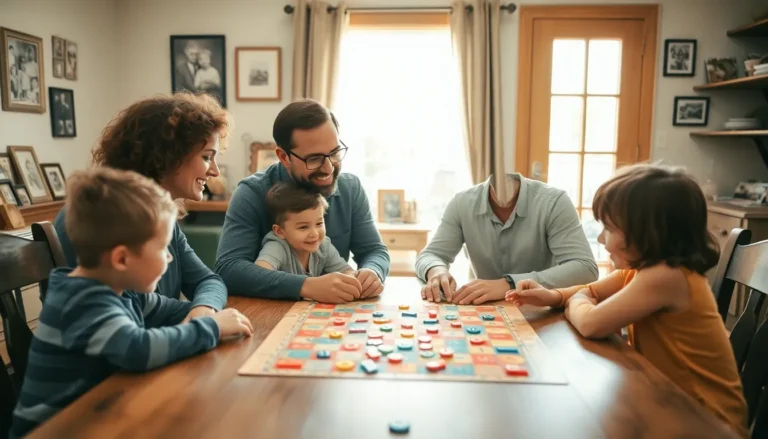Table of Contents
ToggleFamily language games are the secret sauce to turning mundane family time into a riot of laughter and learning. Imagine a living room filled with giggles as everyone tries to outwit each other with puns, riddles, and clever wordplay. These games not only spark creativity but also strengthen bonds, making communication a delightful experience instead of a chore.
In a world where screens often steal the spotlight, family language games offer a refreshing escape. They encourage everyone to put down their devices and engage in playful banter that sharpens language skills while creating unforgettable memories. So why not gather the troops and dive into a world where words become weapons of fun? After all, who wouldn’t want to unleash their inner word wizard?
Overview of Family Language Games
Family language games offer an engaging method for enhancing communication skills. These interactive activities encourage participants to explore vocabulary. They often include word-based challenges, riddles, and storytelling components.
Children develop their language abilities while adults rediscover the joy of playful conversation. Each game contributes to a family environment where creativity thrives. In addition, these games promote critical thinking and problem-solving among players.
Families can choose from various games, such as charades, Pictionary, and word association. Such games not only foster teamwork but also spark laughter and joy during play. Intergenerational participation strengthens bonds, allowing members of different ages to connect through shared experiences.
Research shows that using language games in families can significantly improve verbal skills. Engaging regularly in these activities nurtures a culture of learning. This approach leads to heightened language proficiency and improved listening skills.
Language games also allow families to explore culture and tradition through stories. By sharing personal anecdotes, families create a sense of belonging and continuity. Each story shared forms a unique narrative that strengthens family identity.
Encouraging participation in language games results in wider vocabulary and better communication skills. Both children and adults benefit from consistent practice in a fun format. Overall, family language games cultivate a positive atmosphere that enhances relationships and learning.
Types of Family Language Games

Family language games come in various forms, each promoting communication and creativity. Here’s a closer look at two popular types.
Word Games
Word games engage participants in playful yet educational challenges. Families might enjoy creating crosswords or solving word searches, stimulating vocabulary and spelling skills. Charades offers another fun option where players act out words or phrases, encouraging non-verbal communication. Scrabble, a classic board game, also fosters teamwork and strategic thinking. Each of these activities enhances verbal skills while creating opportunities for bonding and laughter within the family unit. Many families report improved language abilities after regularly practicing these games.
Role-Playing Games
Role-playing games allow family members to step into different characters and scenarios. These games cultivate imagination and storytelling skills, sparking deep conversations among participants. Families might create their own stories or reenact favorite books and movies, which provides a platform for artistic expression. This type of game nurtures empathy as participants understand different perspectives inherent in various roles. Engaging in role-play contributes to critical thinking and fosters connections between generations. Many families find these imaginative activities create lasting memories and enrich their language development.
Benefits of Family Language Games
Family language games significantly enhance various aspects of communication and connection among family members. Engaging in these activities creates enjoyable interactions that promote growth in language skills and strengthen family relationships.
Language Development
Language development flourishes through family language games. Participating in word challenges or storytelling encourages vocabulary expansion, pronunciation improvement, and grammar refinement. Children gain exposure to new words, which aids in building confidence in their speaking abilities. Additionally, adults benefit from rediscovering language through playful engagement, stimulating their creativity. Research highlights that consistent involvement in these games promotes better listening skills, paving the way for more effective communication. Developing a shared language through storytelling and word-based challenges nurtures a culture of literacy, setting a foundation for ongoing academic success.
Social Skills Enhancement
Social skills enhance significantly through family language games. Engaging in these activities fosters teamwork and cooperation, as participants often work together to solve riddles or compete in word games. This collaborative spirit nurtures empathy and respect for different viewpoints. Furthermore, role-playing games allow family members to step into diverse characters, cultivating both imagination and interpersonal communication. Engaging in discussions or sharing stories develops confidence in expressing thoughts and opinions. Research shows that children participating in language games exhibit improved social interactions and relationship-building skills, contributing to their overall emotional intelligence. Through playful exchange, families cultivate a sense of belonging, reinforcing their emotional connections.
Tips for Implementing Family Language Games
Implementing family language games enhances communication and strengthens bonds. Following these tips ensures a fun and educational experience for everyone involved.
Choosing Appropriate Games
Select games that match the age and interests of family members. Consider incorporating word games like Scrabble or Boggle for older children and adults. Choose storytelling games for younger kids to spark their imagination. Tailor activities to platform specific interests or cultural backgrounds, making the experience relatable. Ensure that each game promotes language development while being enjoyable. Involving everyone in the decision process fosters excitement and encourages participation.
Creating a Fun Atmosphere
Establish a relaxed environment that invites participation. Use cozy seating arrangements to facilitate conversation and create an open space. Setting a specific time each week for games can build anticipation among family members. Adding music or snacks contributes to an enjoyable ambiance. Celebrate achievements and recognize everyone’s contributions to maintain enthusiasm. Engage in lighthearted banter to enhance enjoyment and keep the atmosphere lively. When the environment feels fun, family members embrace the learning opportunities these games provide.
Family language games offer a unique opportunity to blend fun with learning. They not only enhance language skills but also create cherished moments that families will remember for years to come. By engaging in these playful activities, families can cultivate a nurturing environment that promotes communication and connection.
Encouraging participation in language games fosters teamwork and empathy among family members. As they navigate word challenges or create imaginative stories, they strengthen their bonds and develop essential social skills. This shared experience enriches family life and supports children’s growth in a supportive atmosphere.
Ultimately, embracing family language games can transform how families interact. It’s a simple yet powerful way to enrich communication and create lasting memories that resonate through generations.






